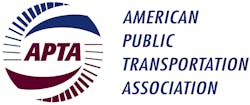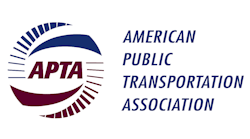Trump Administration's Proposed Cuts to Transit Puts 800,000 Jobs at Risk and Reduces Economic Output by $90B
The Trump Administration's proposed cuts to public transportation in its America's Blueprint budget, if fully implemented, would put at risk 800,000 jobs, including 502,000 construction and related jobs; and an additional 300,000 longer term jobs associated with economic productivity. Overall, this will result in a possible loss of $90 billion in economic output. These data are based on an analysis prepared by the Economic Development Research Group for the American Public Transportation Association (APTA).
In a forum held on Capitol Hill, APTA brought together leaders from communities of various sizes including non-traditional transit oriented places that make up "Main Street America." They examined the significant impact federal investment in public transit has already had on local economic development, job growth, and quality of life in each of their communities.
The benefits they described would not have been realized under the Trump Administration's proposed cuts to the federal public transit program, which would halt progress on more than 50 new and expanded public transit projects in communities in 23 states which are a vital part of America's economic "Main Streets."
"Federal investment in public transit must be a priority because it truly impacts communities of all sizes," said Kirk Dillard, board chair of the Northeastern Illinois Regional Transportation Authority and former Illinois State Senator. "One just has to look at the increase in home values and new businesses near mass transit in our region to understand immediately the importance of mass transit to riders and non-riders alike," he said. "Especially in our state, where we've not had a statewide capital plan for years, federal funding is critical to the regional transit agencies' ability to provide more than two million rides each weekday."
The Economic Implications of Proposed Public Transit Capital Funding Cuts analysis shows that the Administration's cuts will provide for a severe loss of investment spending. The cuts would jeopardize $38 billion of planned projects. The 502,000 jobs at risk equate to 49,000 jobs every year in America's local communities over a ten-year period. The type of jobs directly impacted include general construction and public transit equipment manufacturing. In addition, 300,000 longer-term jobs associated with permanent, ongoing, economic growth and development are in jeopardy.
"As a former Mayor of Mesa, Arizona, I have seen first-hand the transformative effects of smart investments in public transportation," said Scott Smith, CEO of Valley Metro. "Leveraging the federal dollars helps our city generate increased revenue from our tax base and provides the crucial transportation services for residents of all walks of life."
"Public transportation plays a critical role in growing our economy and increasing access to opportunity by better connecting residents to jobs, education and healthcare" said Mark Fisher, chief policy officer for the Greater Indianapolis Chamber of Commerce and Board Member of IndyGo. "Indianapolis, like many communities across the nation, said "yes" to better transit in November by voting to support a local, dedicated revenue to right-size our transit system. Federal support for key transit infrastructure investments will ensure that local communities have the resources to operate frequent and reliable transit service — an absolute necessity for access to employment opportunities."
"These proposed cuts will devastate the working class by causing job losses and turning back the economic progress being made on Main Street America," said APTA Acting President and CEO Richard White. "As Congress works to wrap-up the appropriations for this fiscal year and address the FY 2018 budget, we believe the place to start is by fully funding the FAST Act at levels that were approved by Congress in 2015. In addition, the next best thing the Administration and Congress can do together is to make public transportation a vital part of any new infrastructure initiative."




